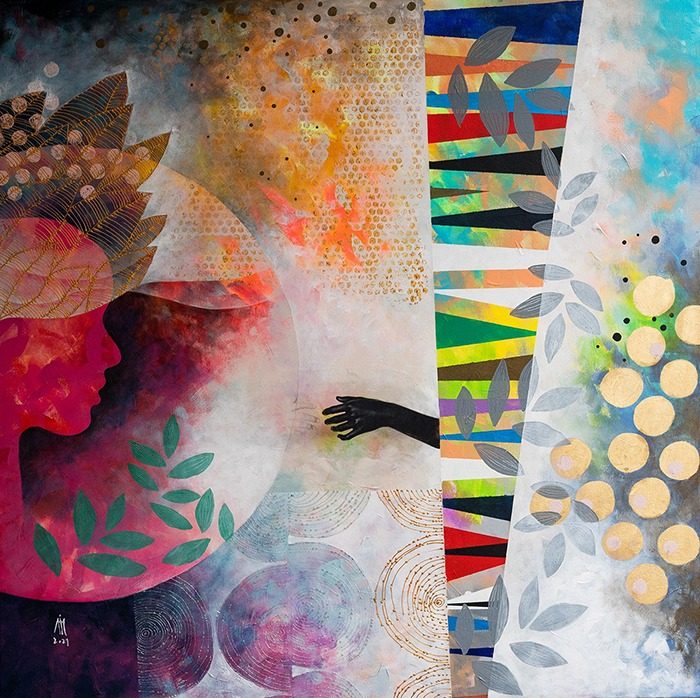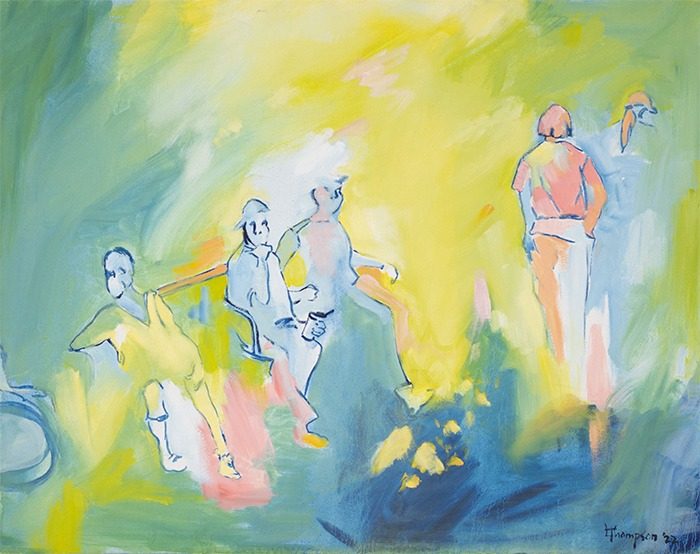Any interest and enthusiasm geared towards your art is a good thing, but gaining the attention of a seasoned art dealer? That’s a whole different ball game, rife with potential opportunities as well as possible pitfalls.
If you’re a professional artist that’s eager to exhibit and sell, being approached about potential representation can seem like the ultimate breakthrough. But all art professionals are not created equal, and knowing if an art dealer is the right fit can require a little finesse and a lot of smart questions.
Whether weighing an offer from a physical gallery space, an online art gallery, or an independent art dealer, there are important details that you’ll need to consider. Do they require exclusivity? How long does the typical working relationship last? Do they take a fair commission (less than 60%) and offer flexibility? And does the art dealer have an impressive professional history, complete with important career milestones and connections that can work in your favor?
Regardless of whether you’re participating in one-off group exhibitions or discussing a more long term arrangement, if you’re meeting with a potential art dealer, you need to show up fully prepared and with a deep understanding of what you expect to get out of the relationship. Using your good judgment to find a trusted professional with the right experience is an important first step, but ultimately, a truly great art dealer is a significant investment of your time and energy.
The hardest part? Instead of chomping at the bit for just anyone to represent you, shift your focus to finding the right art dealer for you. Implementing a little strategy and understanding the big picture can potentially lead you towards the most significant relationship of your professional career, which is why we’ve created this guide.
We’ve reached out to various artists from diverse backgrounds to learn from their expertise and help you find the right art dealer to present and sell your work. Are you ready to share with a wider audience and gain access to serious collectors? Then you’re in the right place.

An art dealer offers a support and guidance. “Helping hand” by Andreia Cismasiu.
Get to know the galleries
As a professional artist with a serious practice, you already understand how important it is to research different galleries and narrow them down to the ones that are most suitable for your work. Your ideal art dealer likely works with many spaces, so take a look at each gallery’s roster and look for other creatives whose practice dovetails with your own. This allows you to know that an art dealer will feel a genuine connection with your work and understand it, giving them a critical advantage when it comes to making a sale.
You’ll also want to take a look at the selling habits of any gallery you’re considering partnering with. Looking at artists whose work feels similar to your own, do a little research to understand where they’ve been placed. Were they represented in major survey exhibitions, like the Whitney Biennial or the New Museum Triennial? Is their work held in major international collections as a result of their relationship with the gallery? If their career trajectory has directly improved because of this partnership, then you’re on the right track.
A great gallery is just the first step, however, and it’s good to be reminded that your own efforts will go a long way in ensuring a successful partnership. Be sure to ask, “What is the gallery doing that’s worthy of my time?”. You’ve spent countless hours creating and promoting the work, which might ultimately result in a sale. Be sure that they’re pulling their weight: the key here is to look for a symbiotic relationship that’s based on good business and professional integrity.
Don’t ignore the chemistry
So you’ve done your research and feel confident that your chosen gallery is a fierce advocate for the artists they represent. That’s an excellent first step, but don’t sign that contract just yet!
Just as important as identifying solid business partners is asking yourself if you have chemistry with your art dealer. Do you feel like they’re able to intuit the themes present in your work? Do they have a strong grasp of the concepts and processes within your oeuvre? Artist and curator Sharilyn Neidhardt sums up the importance of an art dealer instinctively grasping your art: “A person who can talk intelligently about my work with me is someone who will be able to represent that work to other people.” It doesn’t matter how many collectors a gallerist or art dealer knows: if they’re unable to communicate what makes your artwork unique, they won’t be able to sell it effectively.
Get clear on exhibition costs and payment schedules
Having an art dealer with a great reputation selling and placing artwork is important, but it might be even more vital to understand their intention when dealing with artists. Imagine selling your work to a major collector, but never receiving a check. Sadly, prestige doesn’t pay the bills.
So what should you be on the lookout for? Think critically about whether they both understand and respect your current work, while exhibiting a curiosity about what’s coming down the pipeline. Do they engage with you about what you’re working on? Do they follow you on social media or take the time to meet with you and follow what you have in store? Perhaps most importantly, are they open and detailed about their expectations of you if you pursue a professional relationship? These are all great signs that your art dealer really “gets it” and indicates that they’re trustworthy and committed to representing your work well.
Identify potential warning signs
In addition to being a great promoter and salesperson, your art dealer will have a direct influence on your career and even the money that you’re meant to receive. Translation? You need to work with someone that you can trust.
Ask about their intentions when it comes to exhibiting your work, and be sure to work out the details surrounding how both parties make money (this also includes how long it takes to receive payment after a sale). Do their operations include a financial model that relies on its artists to cover the cost of the exhibition? Be sure to gather all the details before proceeding, and keep an eye out for any red flags—it’s not uncommon to share some of the costs, but be sure to avoid any “pay to play” situations.
According to one person we spoke with, “Red flags for me are a person who is unclear on details, like who is responsible for shipping or how fees from sales will be distributed. I like to have responsibilities spelled out clearly up front. I also shy away from any shows that have hanging fees or too many upfront resources required from me.” Another important consideration? Remember that time is money. If an art dealer is giving you far too many responsibilities, like hanging an exhibition or giving a lot of money up front, it might be a sign that they’re unable to invest in you as much as you’d hoped.

An art dealer helps you navigate a complex landscape. “Unsheltered” by Leah Thompson.
Build a meaningful relationship with your art dealer
A relationship with a gallerist or art dealer is like any other relationship in that it requires consistent attention, honesty, and transparency. This means that you also have a responsibility in making sure that the lines of communication are open and that both parties are on the same page.
Reach out regularly with updates about your practice, follow through with any commitments you’ve agreed to, and respond to sales and press correspondence as requested. While we hope it’s also friendly, your relationship with your art dealer is meant to elevate you both professionally. Especially as your practice evolves and grows, you should feel comfortable asking your art dealer about the direction of your work and how they’re willing to support it. Do they understand the ideas you’re trying to explore? Do they believe in this new vision? Allow yourself to open up and be vulnerable: this foundation of trust and mutual respect can be truly magical and galvanizing.
It can take a lot of time and energy to find the right person, but partnering with a trustworthy art dealer can elevate your practice, expose you to new corners of the art market, and introduce you to a brand new audience. Are you interested in working with someone that’s equal parts business savant and cultural critic? Then an art dealer might be just what you’re looking for—you just need to take a breath and get started.
